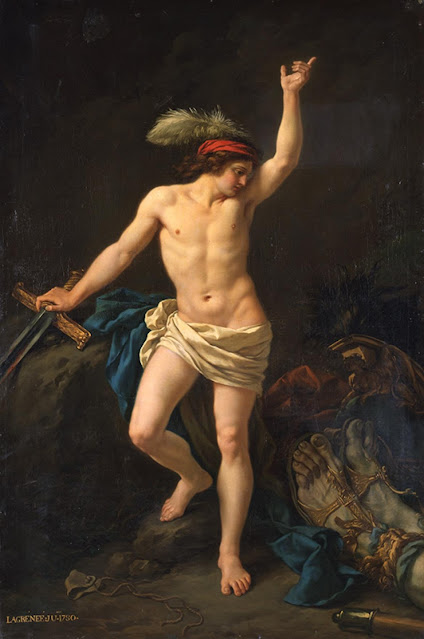 |
| Bernardo Bellotto Equestrian Portrait of Hussar Officer 1773 oil on canvas Kunsthistorisches Museum, Vienna |
-Morgan-Library-New-York.jpg) |
| Taddeo Zuccaro Group of Soldiers ca. 1563-65 drawing (study for fresco) Morgan Library, New York |
 |
| Jean-Jacques Lagrenée David triumphing over Goliath 1780 oil on canvas Musée des Beaux-Arts de Caen |
-John-and-Mable-Ringling-Museum-of-Art-Sarasota.jpg) |
| Anonymous Florentine Artist Battle between Romans and Gauls ca. 1470-80 oil and tempera on panel (originally part of a cassone) John and Mable Ringling Museum of Art, Sarasota |
 |
| Raphael Study for Figure of Fallen Soldier ca. 1511-14 drawing Ashmolean Museum, Oxford |
 |
| Jean-Simon Berthélemy Death of a Gladiator 1773 oil on canvas Los Angeles County Museum of Art |
 |
| Hans Thoma War 1907 oil on canvas Städel Museum, Frankfurt |
 |
| Franz Anton Maulbertsch Coriolanus outside the Walls of Rome ca. 1794-95 oil on panel Staatsgalerie, Stuttgart |
 |
| Donato Creti Study for a Figure of Alexander the Great ca. 1700 drawing Clark Art Institute, Williamstown, Massachusetts |
 |
| Thomas Sully Portrait of Jean Terford David 1813 oil on canvas Cleveland Museum of Art, Ohio |
-Pallas-Athena-c1560-drawing-Graphische-Sammlung-Albertina-Vienna.jpg) |
| Giuseppe Porta (Giuseppe Salviati) Pallas Athena ca. 1560 drawing Graphische Sammlung Albertina, Vienna |
 |
| Giovanni Battista Benaschi Figure wielding Sword ca. 1678 drawing Staatsgalerie, Stuttgart |
 |
| Giovanni Battista Piazzetta Head of a Young Soldier ca. 1740 drawing Städel Museum, Frankfurt |
-Art-Institute-of-Chicago.jpg) |
| Hamo Thornycroft Teucer, brother of Ajax 1882 bronze (made in Rome) Art Institute of Chicago |
 |
| Anonymous Netherlandish Artist Head of Warrior with Helmet ca. 1530-40 drawing Rijksmuseum, Amsterdam |
 |
| Roman Empire Helmet AD 50 bronze and iron Musée d'Art Classique de Mougins |
from Baile and Aillinn
Argument: Baile and Aillinn were lovers, but Aengus, the Master of Love, wishing them to be happy in his own land among the dead, told to each a story of the other's death, so that their hearts were broken and they died.
I hardly hear the curlew cry,
Nor the grey rush when the wind is high,
Before my thoughts begin to run
On the heir of Ulad, Buan's son,
Baile, who had the honey mouth;
Before my thoughts begin to run
On the heir of Ulad, Buan's son,
Baile, who had the honey mouth;
And that wild woman of the south,
Aillinn, who was King Lugaid's heir.
Their love was never drowned in care
Of this or that thing, nor grew cold
Because their bodies had grown old.
Their love was never drowned in care
Of this or that thing, nor grew cold
Because their bodies had grown old.
Being forbid to marry on earth,
They blossomed to immortal mirth.
– W.B. Yeats (1903)
– W.B. Yeats (1903)